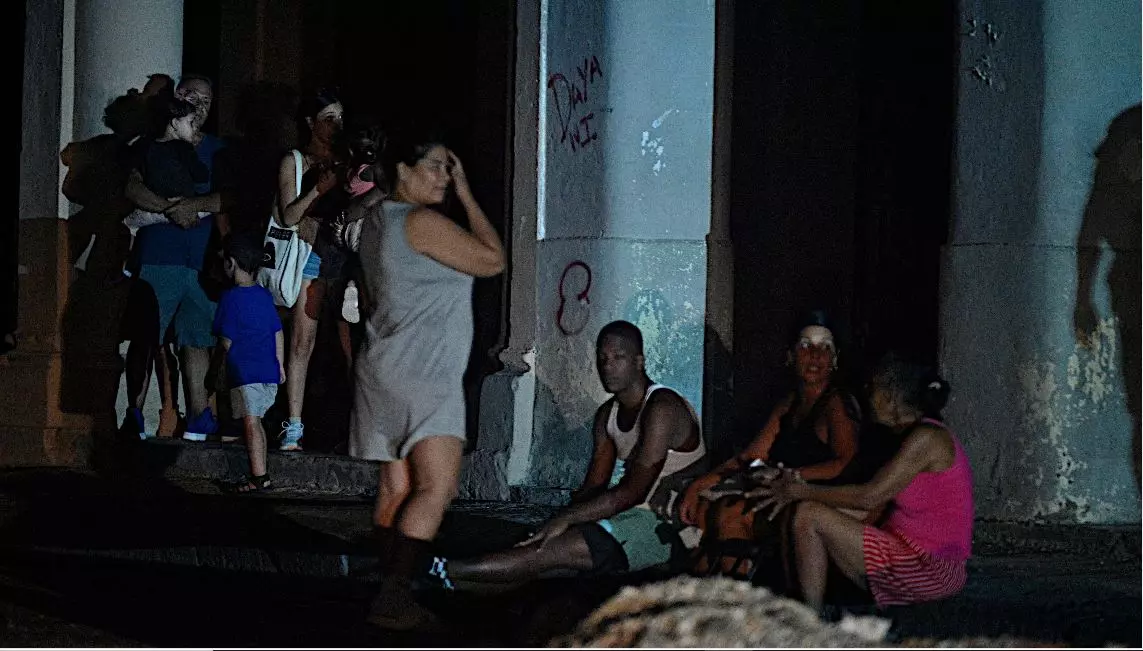Cubans struggle without power after hurricane hits island

Havana: Many Cubans faced continued uncertainty late Sunday as electricity had yet to be fully restored following a nationwide blackout. Their plight worsened as Hurricane Oscar struck Cuba's eastern coast, bringing heavy rain and strong winds.
Energy Minister Vicente de la O Levy expressed hope that the country's electricity grid would be back online by Monday or Tuesday morning. However, he acknowledged that Hurricane Oscar, which made landfall on Sunday evening, would complicate recovery efforts, particularly in regions critical for power generation. Key facilities, such as the Felton power plant in Holguín and the Rent plant in Santiago de Cuba, are situated in the storm's path.
Reports indicated rain and thunderstorms in eastern provinces, with two-meter swells impacting the coastal areas near Baracoa, where Oscar made landfall. While no fatalities have been reported so far, local media noted damage to roofs and walls in affected areas.
In Havana, some neighborhoods saw electricity restored, but much of the capital remained in darkness. The blackout has had broader implications, disrupting services like water supply that depend on electricity for pumping. Many residents resorted to cooking on improvised wood stoves as food in refrigerators began to spoil.
Ylenis de la Caridad Napoles, a mother of a 7-year-old girl, expressed her despair, saying she is reaching a breaking point. The recent failure of the Antonio Guiteras power plant, which caused the collapse of the entire electricity system, is the latest setback in a long history of energy distribution issues in Cuba.
On Sunday, long lines formed at the few bakeries able to reopen, with many Cubans waiting hours for bread. Rosa Rodríguez, who has been without electricity for four days, lamented, “We have millions of problems, and none of them are solved. We must come to get bread because the local bakery is closed, and they bring it from somewhere else.”
Por la compleja situación energética y el huracán, no podemos celebrar el #DíaDeLaCulturaCubana, en memoria de los que hace 156 años salieron a conquistar la independencia. Pero tenemos Patria, Revolución y socialismo, es decir, garantía de protección para todos.#CubaEsCultura
— Miguel Díaz-Canel Bermúdez (@DiazCanelB) October 20, 2024 ">Also Read:
The blackout initially affected half of Cuba on Thursday evening before plunging the entire island into darkness on Friday morning due to the power plant failure. The collapse is considered the worst since Hurricane Ian hit in 2022, which caused extensive damage to power infrastructure. In recent months, some homes have experienced outages lasting up to eight hours daily.
Although the Cuban government claimed some electricity was restored following the failure of a major power plant, the total energy supply quickly dropped from 500 megawatts to 370 megawatts, far below the typical demand of 3 gigawatts.
Even for a country accustomed to outages amid a deepening economic crisis, Friday's collapse was significant. In response, the Cuban government has enacted emergency measures to reduce electricity demand, including suspending classes, closing state-owned enterprises, and canceling non-essential services.
Local authorities attributed the outage to increased demand from small and medium-sized businesses and residential air conditioning units. The situation deteriorated further due to breakdowns in outdated thermoelectric plants, which have suffered from inadequate maintenance and a lack of fuel.
De la O Levy mentioned that the electricity grid would have fared better had it not experienced two additional partial blackouts while authorities attempted to restore power on Saturday. He also stated that assistance had been offered by countries including Mexico, Colombia, Venezuela, and Russia.
According to the U.S. National Hurricane Center, Oscar made landfall on Cuba’s eastern coast after striking the southeastern Bahamas earlier on Sunday. The storm hit near Guantánamo with maximum sustained winds of 75 mph (120 kph).
Forecasters expect the system to move across eastern Cuba Sunday night into Monday, bringing 6 to 12 inches (15.2 to 30.5 centimeters) of rain, with isolated areas possibly receiving up to 18 inches (45.72 centimeters). A storm surge of up to 3 feet (0.91 meters) may also occur along parts of Cuba’s northern shore.
As of late Sunday, Oscar was located about 45 miles (75 kilometers) east of Guantánamo, having made landfall earlier on Great Inagua Island in the Bahamas.

